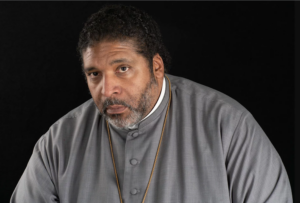
Rev. Dr. William Barber, II (Photo: Knightopia – Wikipedia)
The following article was published in The Algemeiner on Oct. 28, 2021.
On Wednesday, October 27, Rev. Dr. William Barber II, gave a lecture in honor of Nobel laureate Elie Wiesel. During his lecture, which was sponsored by Boston University’s Jewish Studies Center, Barber — who has said some false and dishonest things about Israel in the past — demonstrated that while he may be an ambitious and attention-seeking opportunist, he is no dummy.
Barber, a prominent African-American activist who has previously and often described Jesus as a “brown-skinned Palestinian Jew,” didn’t use that phrase once last night — and he had nothing to say about the Arab-Israeli conflict.
He may have said the word “Israel” in reference to the prophets in the Bible, but otherwise, the word didn’t come out of his mouth. Last night’s lecture was all about poverty, and garnering support for a poverty march on Washington that Barber is planning for 2022.
Barber was on notice after CAMERA produced an article highlighting his previous statements about the Arab-Israeli conflict, including a tweet in which Barber falsely accused Israel of “targeting” Palestinian children. Barber has also downplayed Palestinian violence against Israeli civilians, including during a 2018 speech, when he said, “Palestinians have a long history of nonviolence.”
For example, in the same 2018 speech, Barber obliquely accused Israel of perpetrating a “state crucifixion” against the Palestinian people. He also participated in a 2021 Easter service organized by the anti-Zionist Sabeel Ecumenical Liberation Theology Center, whose founder, Rev. Dr. Naim Ateek, deployed crucifixion imagery against Israel during the Second Intifada.
Barber’s past statements made reasonable people wonder if BU should have invited him to give a lecture in honor of Elie Wiesel. Elisha Wiesel, Elie’s son (who is scheduled to give a memorial lecture of his own on November 8), praised Barber as an activist, but declared that Israel does not intentionally target Palestinian children and that “the history of the Palestinian response to the return of the Jewish people to our homeland has been very different from the legacy of non-violence [Barber] describes.”
It was a pretty serious rebuke.
Michael Zank, the director of BU’s Jewish Studies program, came to Barber’s defense — declaring, in effect, that some of the pastor’s best friends are Jews.
“He counts many prominent Jews among his friends and allies, and he regularly speaks in Jewish venues,” Zank wrote in response to the CAMERA article.
Even after downplaying the problems with Barber’s remarks, Zank acknowledged the problem of anti-Zionism in American social movements. Zank asked Barber how young Jews can be enticed into participating in progressive campaigns to advocate for people of color in American society in the face of this rhetoric.
Barber said that it is not necessary for people to be in 100 percent agreement to work together on larger societal problems. But even as he offered this answer, which seems to suggest that American Jews should tolerate anti-Zionism as an inevitable part of the progressive landscape in the US, Barber remained silent about the Arab-Israeli conflict, and for him, that’s an improvement given what he’s said in the past.
Maybe Barber has concluded that Israel-bashing and Jew-baiting are losing strategies when it comes to garnering influence and prestige in American society. It might even be reasonable to hope that Barber has learned the lessons of the Women’s March in 2018 and the Black Lives Matter Movement which suffered irreparable damage to their credibility by becoming vehicles for Israel-bashing and Jew-baiting in American society.
Maybe Barber figured out that he has a choice to make between wearing Yasser Arafat’s keffiyeh and picking up the mantle of Martin Luther King, Jr. — and he’s picked the latter.
